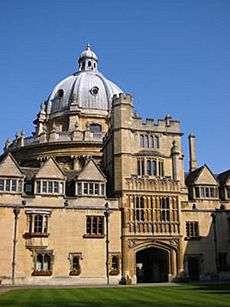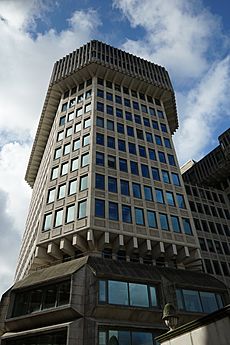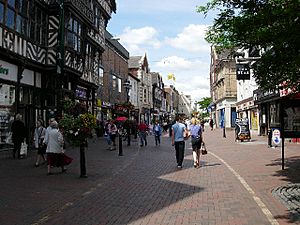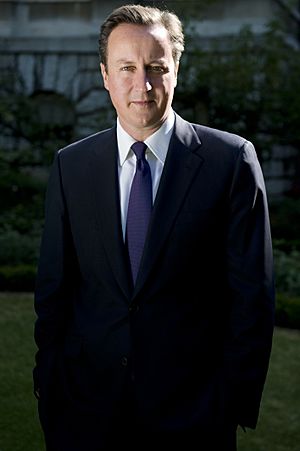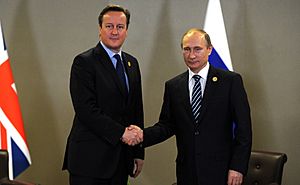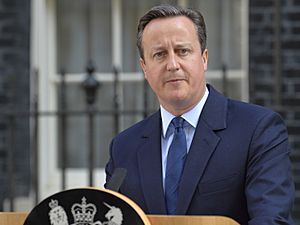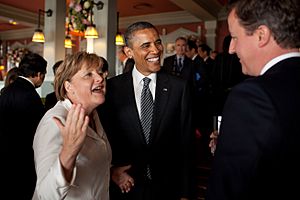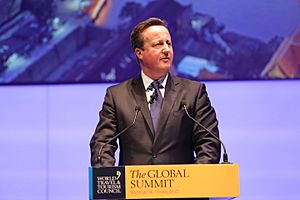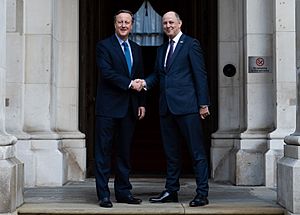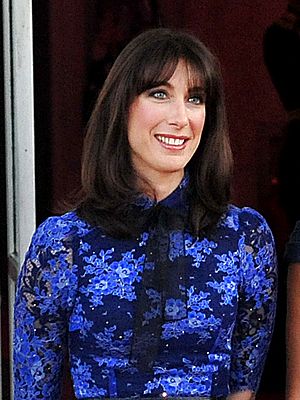David Cameron facts for kids
Quick facts for kids
The Lord Cameron of Chipping Norton
|
|
|---|---|
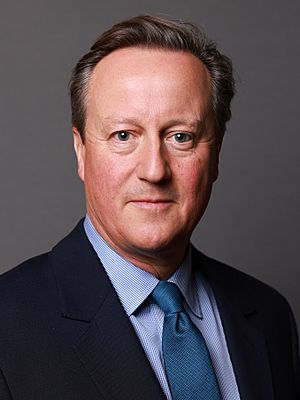
Official portrait, 2023
|
|
| Prime Minister of the United Kingdom | |
| In office 11 May 2010 – 13 July 2016 |
|
| Monarch | Elizabeth II |
| Deputy | Nick Clegg (2010–2015) |
| First Secretary |
|
| Preceded by | Gordon Brown |
| Succeeded by | Theresa May |
| Secretary of State for Foreign, Commonwealth and Development Affairs | |
| In office 13 November 2023 – 5 July 2024 |
|
| Prime Minister | Rishi Sunak |
| Deputy | Andrew Mitchell (2024) |
| Preceded by | James Cleverly |
| Succeeded by | David Lammy |
| Leader of the Opposition | |
| In office 6 December 2005 – 11 May 2010 |
|
| Monarch | Elizabeth II |
| Prime Minister |
|
| Deputy | William Hague |
| Preceded by | Michael Howard |
| Succeeded by | Harriet Harman |
| Leader of the Conservative Party | |
| In office 6 December 2005 – 11 July 2016 |
|
| Preceded by | Michael Howard |
| Succeeded by | Theresa May |
|
|
| Assumed office 17 November 2023 |
|
| Member of Parliament for Witney |
|
| In office 7 June 2001 – 12 September 2016 |
|
| Preceded by | Shaun Woodward |
| Succeeded by | Robert Courts |
| Shadow cabinet portfolios | |
| 2003 | Privy Council Office |
| 2004 | Local Government |
| 2004–2005 | Head of Policy Coordination |
| 2005 | Education and Skills |
| Personal details | |
| Born |
David William Donald Cameron
9 October 1966 Marylebone, London, England |
| Political party | Conservative |
| Spouse | |
| Children | 4 |
| Relatives | Cameron family |
| Education | |
| Signature | |
David William Donald Cameron, Baron Cameron of Chipping Norton (born 9 October 1966) is a British politician. He was the Prime Minister of the United Kingdom from 2010 to 2016. During his time as Prime Minister, he led the first coalition government in the UK since 1945. He stepped down after a public vote decided the UK should leave the European Union.
After his time as Prime Minister, he served as the Foreign Secretary in Rishi Sunak's government from 2023 to 2024. After the 2024 general election, Cameron decided to retire from top-level politics. He still holds his seat in the House of Lords.
Early Life and Education
David William Donald Cameron was born on 9 October 1966 in Marylebone, London. He grew up in Peasemore, Berkshire. His father, Ian Donald Cameron, was a stockbroker. His mother, Mary Fleur, was a retired Justice of the Peace. David has two sisters and an older brother.
Cameron went to two private schools. From age seven, he attended Heatherdown School in Winkfield, Berkshire. At 13, he went to Eton College in Berkshire, just like his father and older brother. He was very interested in art when he was younger.
After leaving Eton in 1984, Cameron took a nine-month break before university. This is often called a gap year.
In October 1985, Cameron started studying Philosophy, Politics and Economics (PPE) at Brasenose College, Oxford. His teacher, Vernon Bogdanor, said Cameron was one of his "ablest" students. Cameron finished his degree in 1988 with top honours.
Political Career
After university, Cameron worked for the Conservative Research Department from 1988 to 1993.
In 1994, Cameron became the Director of Corporate Affairs at Carlton Communications. This was a growing media company. He left this job in 2001 to run for Parliament.
When he was elected to Parliament, Cameron joined the Commons Home Affairs Select Committee. This was an important role for a new Member of Parliament (MP).
In 2003, Cameron became a shadow minister. He worked in the Privy Council Office. He also became a vice-chairman of the Conservative Party. Later, he became the spokesperson for local government. In 2004, he joined the Shadow Cabinet as head of policy. He then became the Shadow Education Secretary.
From 2005 to 2016, Cameron was the Leader of the Conservative Party.
Prime Minister (2010–2016)
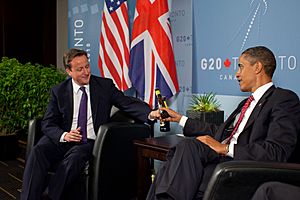
On 11 May 2010, Gordon Brown resigned as Prime Minister. Queen Elizabeth II then asked Cameron to form a new government. At 43, Cameron was the youngest Prime Minister since 1812. He announced that he would form a coalition government. This meant his party would work with another party. He said he wanted to "put aside party differences" for the good of the country.
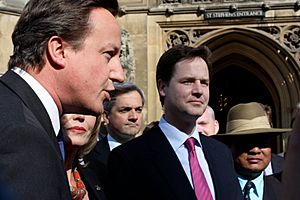
After a big economic downturn, Cameron started a program to reduce government spending. This was called an austerity program. Its goal was to lower the government budget deficit. By 2015, the deficit was cut in half compared to 2010.
NATO Action in Libya
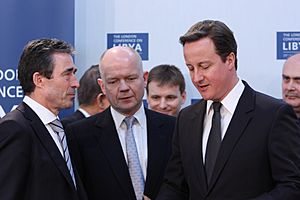
Cameron spoke out against the violence in the Libyan Civil War. In March 2011, the United Nations Security Council approved a "no-fly zone." This was to stop government forces from attacking rebels from the air. Soon after, the UK and the United States launched missiles at targets in Libya.
Cameron said he was "proud" of the UK's role in removing the Libyan leader, Muammar Gaddafi.
Falkland Islands Referendum
In 2013, Argentina wanted to discuss who owned the Falkland Islands. So, a referendum was held. The people living in the Falkland Islands voted on whether they wanted to remain a British territory. A huge 99.8% voted to stay with the UK.
Cameron said, "We believe in the Falkland islanders' right to self-determination." He added that the UK would "protect and defend them."
Military Action in Iraq and Syria
In 2013, Cameron wanted to bomb Syrian forces. However, Parliament voted against it. This was a rare defeat for a Prime Minister on foreign policy. In 2014, MPs voted for British planes to join a bombing campaign against Islamic State (IS) in Iraq. Cameron promised to get Parliament's approval before extending attacks to IS in Syria.
After the terrorist attacks in Paris in 2015, Cameron pushed for the Royal Air Force to bomb Syria. He told MPs it was needed to keep Britain safe. On 3 December 2015, MPs voted to launch air strikes against IS targets in Syria.
2016 Referendum and Resignation
Cameron had promised a referendum on whether the UK should stay in the European Union. He campaigned for Britain to remain in a "reformed EU." The option to leave was called Brexit.
The vote took place on 23 June 2016. About 52% voted to leave the EU, and 48% voted to stay. The next day, Cameron announced he would resign as Prime Minister. He said he did not think it was right for him to lead the country after campaigning to remain. He left office in July 2016.
Cameron first said he would stay in Parliament as an MP. But on 12 September, he announced he was resigning his seat right away.
Political Views
Poverty
In 2006, Cameron called poverty a "moral disgrace." He promised to work on reducing it. In 2007, he said, "We can make British poverty history." He also stated that "Ending child poverty is central to improving child well-being."
Marriage and Family
In 2009, Cameron said that "family values" were important for fixing "broken Britain." In 2013, he described himself as "a marriage man." He said he wanted to "promote marriage, defend marriage, encourage marriage."
After Being Prime Minister (2016–2023)
In October 2016, Cameron became chairman of the National Citizen Service Patrons. In January 2017, he became president of Alzheimer's Research UK. This role helps raise awareness about dementia and supports research funding.
All his new jobs after being Prime Minister had to be approved by a government committee.
Foreign Secretary (2023–2024)
On 13 November 2023, Cameron was appointed Foreign Secretary. This meant he became a member of the House of Lords. He was the first former Prime Minister since 1970 to be appointed to a government role.
His time as Foreign Secretary focused on the Israel-Hamas war and the Gaza humanitarian crisis. Cameron visited many countries during this time. He called for a "sustainable ceasefire" in Gaza and more aid to reach the area. He also asked the Israeli government to protect civilians more.
After the 2024 general election, Cameron was replaced by David Lammy. Cameron congratulated Lammy and announced he was retiring from frontline politics. He continues to hold his seat in the House of Lords.
Memoir
On 19 September 2019, Cameron published his memoir, For the Record. A memoir is a book about a person's life experiences. He reportedly signed a large contract for the book.
Personal Life
Family
Cameron is married to Samantha Cameron (born Sheffield). They met through Cameron's sister and married in 1996.
The Camerons have four children. Their first son, Ivan, was born in 2002. He had a rare combination of cerebral palsy and severe epilepsy. Ivan needed constant care and sadly passed away in 2009 at age six. Cameron said, "The news hits you like a freight train... But then you get over that, because he's wonderful."
They have two daughters, Nancy (born 2004) and Florence (born 2010). They also have another son, Arthur (born 2006). Cameron took paternity leave when Arthur and Florence were born. Florence was born early while the family was on holiday in Cornwall. Her third name, Endellion, comes from a village near where they were staying.
In 2008, the Camerons decided to send their daughter Nancy to a state primary school. Their home in Dean, Oxfordshire, is known as part of the "Chipping Norton set."
In September 2010, Cameron's father, Ian Cameron, passed away after a stroke. David Cameron missed a parliamentary session to be with his family.
Hobbies
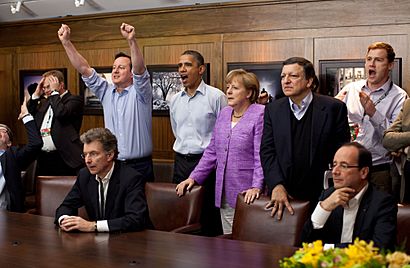
Before becoming Prime Minister, Cameron often rode his bicycle to work. He was sometimes followed by his driver in a car carrying his belongings. He also enjoys jogging and has raised money for charities by running races.
Cameron supports Aston Villa, a football team. He is also a big fan of cricket.
Faith
Cameron is a practicing Christian. He is an active member of the Church of England.
Honours and Awards
 United Kingdom:
United Kingdom:
- 14 December 2005: He was made a member of the Privy Council of the United Kingdom. This gives him the title "The Right Honourable" for life.
- 13 November 2023: He was appointed a Life Peer. This means he became a member of the House of Lords for life.
 Saudi Arabia:
Saudi Arabia:
As a former Prime Minister, Cameron and his wife had special places at the funeral of Queen Elizabeth II in 2022. They also attended the Coronation of King Charles III in 2023.
See also
 In Spanish: David Cameron para niños
In Spanish: David Cameron para niños
- Muscular liberalism
Images for kids
-
David Cameron campaigning in the 2006 local elections at Newcastle upon Tyne on the Gateshead Millennium Bridge
-
Cameron being interviewed at the headquarters of Oxfam in 2006
-
With Theresa May, who was a member of the Shadow Cabinet from 1999 until 2010
-
Visiting British troops in Afghanistan, October 2014
-
With his predecessors Gordon Brown, Tony Blair, John Major and Deputy PM Nick Clegg, during Barack Obama's address in Westminster Hall, June 2011
-
With Israeli Prime Minister Benjamin Netanyahu in Jerusalem, Israel, January 2024
 | Janet Taylor Pickett |
 | Synthia Saint James |
 | Howardena Pindell |
 | Faith Ringgold |


